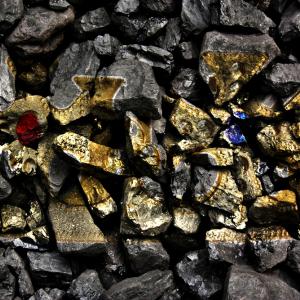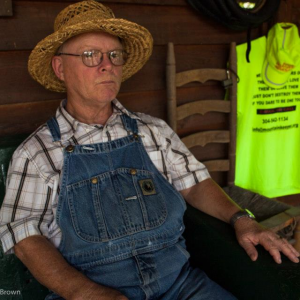
Allen Johnson lives in rural West Virginia. He coordinates the advocacy organization Christians for the Mountains.
Posts By This Author
Coal Country Goes Bust
Getting away with murder in Appalachia.

Christina Richards / Shutterstock
WEST VIRGINIA’S coal-addicted economy is busted. Dozens of bankrupt coal companies are busted. A coal company CEO is busted for flagrant safety violations that contributed to an explosion killing 29 miners.
Boom-and-bust cycles have a jagged history in the central Appalachian coal basin of southern West Virginia, eastern Kentucky, and southwest Virginia. America’s industrial revolution prospered on Appalachia’s steam and coking coal. Hard-gained union struggles brought miners and their communities an improved living standard. Yet as time marched on, machinery replaced miners, the coal industry busted unions, Appalachian coal seams played out, and cheaper Western coal and fracked shale gas outcompeted.
Coal-dependent economies are now tanking. Miner layoffs have skyrocketed. Policymakers have long ignored forecasts of coal’s impending decline. The West Virginia legislature, facing a major state revenue shortfall, is considering drastic budgetary cuts—such as closing state parks, college branch campuses, and state police detachments—while, incredibly, introducing bills to attempt to bring back the coal industry by reducing its severance and worker-compensation taxes.
Coal will not bounce back. From coal’s perspective, the national debate on coal and climate change has largely been lost.
The Clean Power Plan announced by the EPA in June 2014 seeks to reduce climate-warming CO2 emissions 30 percent by 2030. Projected air quality improvement will also deliver significant financial and life-protecting health benefits. However, since West Virginia politicians dance to the strings of their coal-industry puppet masters, State Attorney General Patrick Morrisey is leading a coalition of 25 states asking a federal court to strike down the Clean Power Plan, calling it a “war on coal.”
Frontline Dispatch from the War on Coal
Like sifted coal, the dust is settling after the recent election in the “War On Coal” zone in West Virginia and Kentucky. Ungloved fisted hands lifted high in victory, King Coal. Knocked out cold on the canvas, contenders misleadingly accused of having President Obama and his dreaded coal-killing EPA in their corner.
The campaign propaganda was drearily repetitive. The syllogistic script for Republicans, “My opponent is a Democrat. President Obama is a Democrat whose EPA is killing coal jobs. Therefore my opponent will kill your coal jobs.” Democrat candidates protested vigorously, “As top priority, we will fight to bring the EPA to its knees, and bring coal jobs back!”
It’s been decades since any semblance of a coal boom economy. Comparable coal tonnage is still coming out of Appalachian ground. Machines and explosives began replacing most of the miners in the 1950s. In recent years, Appalachian coal commerce has been facing competitive market realities of cheaper coal mined further west along with a natural gas surfeit. With thicker, accessible Appalachian coal veins long mined out, profitability can still be realized by shaving environmental and safety corners and restoring market demand. The Environmental Protection Agency stands in the way, or so mining communities are told.
I turn to the EPA website and read, “the mission of EPA is to protect human health and the environment.” The first listed EPA purpose is that “all Americans are protected from significant risks to human health and the environment where they live, learn and work.”
And the Mountains Will Fall
New studies reveal the effects of mountaintop removal mining on the people nearby.
SOON AFTER Dr. Michael Hendryx assumed a professorship of health policy management at West Virginia University, he started hearing stories of sick people in Appalachian communities near mountaintop removal coal mining operations. Finding no scientific research that examined the correlation between mountaintop removal and community health, Hendryx and his colleagues began overseeing family health surveys and compiling health data from the Centers for Disease Control and Prevention.
Since 2011, Peter Illyn of Restoring Eden (Christians for Environmental Stewardship) has recruited and led student volunteers from Catholic and evangelical Christian colleges in conducting door-to-door community health surveys for Hendryx’s research. Typical volunteer experiences, according to Illyn, include “aha” epiphanies and deepening conversions to God’s justice. Alex Gerrish, a recent Samford University (Birmingham, Ala.) graduate, recalls a searing experience. Her survey team visited a home located close by two mountaintop removal (MTR) operations, where a mother answered the door. She said, “I’m trying to get my son down for a nap,” explaining that her two-year-old had a heart defect. “Now’s not a good time to talk.” Two days later the team revisited the home to be met by an older, tear-stained woman. “I’m sorry,” she said. “My grandson passed away a couple days ago.” He never woke up from his nap. As Gerrish stood in shock, she recalled the statistics on high birth-defect rates in communities with mountaintop removal operations.
Now, more than two dozen published peer-reviewed studies show a high correlation between populations living amid MTR operations and very high rates of morbidity, asthma, chronic obstructive pulmonary disease, heart disease, cancer, and birth defects.
West Virginia: Where Energy Rules, Subjects Suffer
I’ll be upfront and admit it. When I heard about the chemical spill that shut down the water supply for 300,000 of my fellow West Virginians, I felt an odd tug of relief. “Maybe now something will get straightened out,” I thought to myself.
Sure, what I felt might sound callously unfeeling. After all, the chemical spill closed down businesses and schools, shut down bathing, and reduced populations to scrapping for potable water. Happily, thousands of neighbors and outliers pitched in to deliver water from bottles to tankers to the beleaguered people.
Welcome, world, to West Virginia, your national energy sacrifice state. Our state has a king — name’s Coal. Just as in Nebuchadnezzar’s era (Daniel 3), on cue politicians, business people, and media outlets bow their knee to King Coal lest their fates be a metaphorical fiery furnace.
Before readers think I’m off-track, let me first back up.
Larry Gibson, Keeper of the Mountains
Larry Gibson, “Keeper of the Mountains,” died Sunday, Sept. 9 at his home on Kayford Mountain, W.V. He was 66. His wife and three adult children survive. Gibson had a fifth grade education, a career as a custodian at an Ohio automobile factory, and retired to the obscure and abandoned place of his birth. Gibson stood 5’2”.
“God chose the weak things of the world to shame the strong” (1 Corinthians 1:27b). From the halls of the nation’s most prestigious universities, through innumerable rallies, protests, and arrests, to the many hundreds of tours he hosted on Kayford, Gibson spoke truth to power with uncompromising integrity, unflagging determination, and heroic courage.
Larry Gibson returned to West Virginia in the 1990s, and to his shock, learned that a new method of coal extraction was literally blasting mountains apart to extract coal while shoving the vast remaining rubble into adjacent valleys burying small streams. Ecosystems were being severely, irrevocably degraded. Scarcely anyone knew about mountaintop removal back then, let alone cared.
Political Winter Storms in the West Virginia Coalfields
In the old days, in the coal towns of West Virginia, winter was a time when folks hunkered around the pot-bellied stove and whiled away time spinning stories. At times, someone would fiddle with the draft, poke the coal embers, and release an extra dollop of acrid coal smell. Houses were drafty. Your front side facing the stove could be burning up, your backside shivering cold.
Remembering Judy Bonds, Mountain Defender
This past Monday, January 3, anti-mountaintop removal activist Judy Bonds exhaled her last breath from the homeland she loved.
Mountaintop Removal Kills People
More than 2,000 activists gathered at Freedom Plaza in Washington, D.C.
Is the Cordoba House "Insensitive"?
"Yes, Muslims have the constitutional right to build a mosque near Ground Zero.
King Coal: Ruling Principality and Power in West Virginia
In this month's Sojourners, Onleilove Alston takes a spiritually inflected look at coal country, where last month's EPA decision to ban much mountaintop removal min



